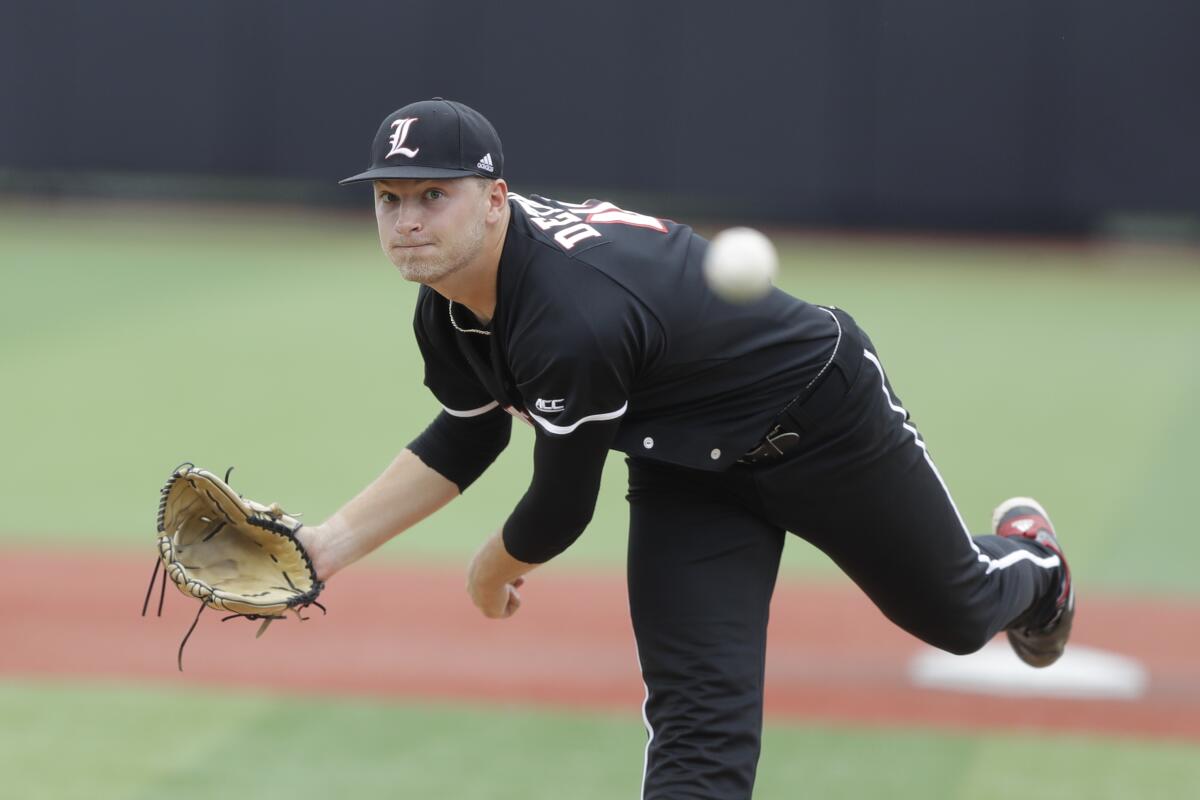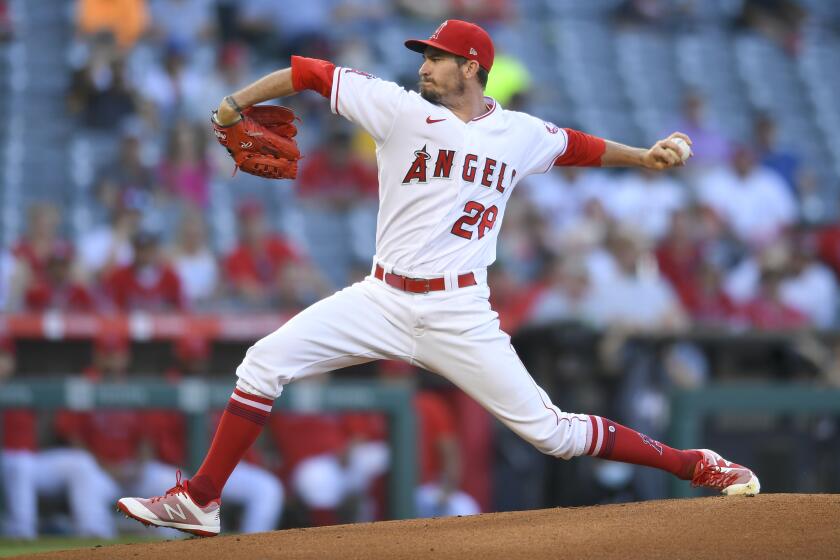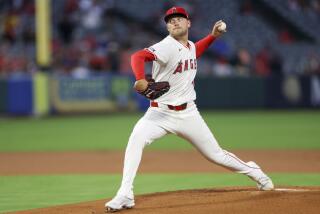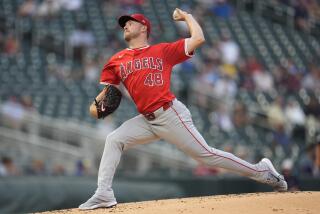Angels’ Reid Detmers showed major stuff quickly in the minors

- Share via
It struck Michael Wuertz early this season, small moments on the field and in the clubhouse that convinced the Angels’ double-A pitching coach that the team had something special in its top pitching prospect.
When Reid Detmers arrived on Wuertz’s staff in Rocket City this spring as a first-time pro — a tall, quiet left-hander drafted 10th overall by the Angels last year — Wuertz recognized the pitcher’s potential, but didn’t know if it would show up right away.
The then-21-year-old hadn’t pitched in a real game in more than a year. Wuertz had worked with Detmers in instructional league, yet knew the grind of a minor-league campaign was another challenge entirely.
But in the span of three months, each little doubt began to fade.
Detmers had a 3.50 ERA and averaged almost two strikeouts an inning in 12 starts in double-A. He showed increased velocity and improved feel for his breaking pitches. And he impressed in other ways too, checking every box the club had for his development.
“He’s very meticulous in everything that he does,” Wuertz said.
The Angels kept their biggest trade pieces — such as closer Raisel Iglesias and starter Alex Cobb — as they sit six games out of a playoff spot.
It was the launching point for a season that will reach new heights Sunday, when Detmers will make his MLB debut as the Angels’ starting pitcher in their series finale against the Oakland A’s.
“It’s been overwhelming, a little bit,” Detmers, 22, said Saturday afternoon after arriving in Anaheim. “But it’s a dream come true.”
Even under normal circumstances, few starting pitchers progress this fast, reaching the majors only 13 months after being drafted.
Detmers’ rise was even more unlikely, with the pandemic forcing last year’s minor-league season to be canceled and this year’s campaign to be delayed by a month.
“I didn’t really set any goals [this year],” Detmers said. “I was just trying to have fun, go out there competing each week. That’s all I could really do.”
But after a dozen appearances in double-A, Detmers was promoted to triple-A Salt Lake earlier this month, pitched a scoreless six-inning gem in his lone start there, then was tabbed Friday to fill an opening in the Angels’ rotation following Andrew Heaney’s trade to the New York Yankees.
“There’s two factors when calling up a player,” Angels general manager Perry Minasian said. “One is from a talent standpoint, performance standpoint. Where they’re at and what they’ve been doing. The second factor is from a mental standpoint, are they able to handle it? We feel like at this time, Reid’s ready to go.”
Detmers’ reputation around the organization has been building since the moment he arrived.
Manager Joe Maddon recalled meeting Detmers at the Angels’ alternate training site in Long Beach last year.
“I walked from center field to the left-field foul line with him,” Maddon said. “And in that 90 feet, I liked the guy a lot. I knew the makeup matched the ability.”
Salt Lake manager Lou Marson — who was around Detmers at the alternate site and then again during his brief stop in triple-A this month — was left with a similar impression.
“He has a presence about him on the mound that I haven’t seen since Griffin Canning,” said Marson, who coached Canning in double-A in 2018. “He was the same, just as confident. He could throw a pitch in any count. Reid is doing the same thing.”
Wuertz, however, has seen as much of Detmers as anyone this season.
“For a 21-year-old kid,” Wuertz said in a phone interview earlier this month, “he’s very polished.”
One of the early indicators that Detmers might move quickly through the organization this year was his increased velocity, which rose a few ticks from the low 90s he averaged in college to now touching 95 to 96 mph.
Detmers said the development wasn’t intentional, calling it an unexpected benefit of a new offseason training program he went through this winter.
“My body felt amazing coming into spring training and made some adjustments on the mound,” Detmers said. “It just kind of happened naturally.”
The results, however, only strengthened a repertoire that includes a wipeout curveball and an ever-improving combination of changeups and sliders.
“I’ve seen highlights of what he’s doing,” said Angels pitcher Alex Cobb. “Just blowing the doors off of guys down in the minor leagues.”
Detmers was inconsistent in his first month, twice failing to get through the third inning because of high pitch counts. Once he got more consistent with his fastball command and began landing his secondary stuff where he wanted, his production skyrocketed.
Detmers’ 97 strikeouts in double-A are still second-most at that level. He was selected to the MLB Futures Game earlier this month and ranked the No. 57 best prospect in the sport by MLB Pipeline. On Sunday, he will also become only the second player from last year’s draft class to reach the big leagues, after the Chicago White Sox’s Gerrett Crochet.
It wasn’t just raw stuff that helped Detmers progress through the minors so fast.
“As good as the box scores are,” Minasian said, “the work ethic in between starts, the preparation for each start, what he puts into it, those reports have been even better.”
In double-A, Wuertz said Detmers developed a regimented routine between starts. During bullpen sessions, the left-hander could not only identify imperfections in his delivery, but correct them within a couple throws.
“Maybe even one pitch at times,” Wuertz added. “Those are just certain things that are hard to teach.”
Detmers also developed a specific scouting routine, studying video of other double-A pitchers with a similar style as him to see how opposing hitters would react.
“He is one of the most prepared pitchers that I have probably worked with over the last four or five years,” Wuertz said. “He gets in there, he studies opposing hitters. His baseball IQ is very good. And as a person, he’s just a quality individual.”
Now, the Angels will find out if he can be a quality big-league pitcher too, ushering him into their rotation after an ascent that was swift but hardly undeserved.
“I did briefly visit with him but I’m not going to give him any advice, other than to go out there and do what he’s been doing all year,” Maddon said. “If he’s staying in his delivery and he’s getting good results, we’ll keep throwing him out there.”
More to Read
Go beyond the scoreboard
Get the latest on L.A.'s teams in the daily Sports Report newsletter.
You may occasionally receive promotional content from the Los Angeles Times.








